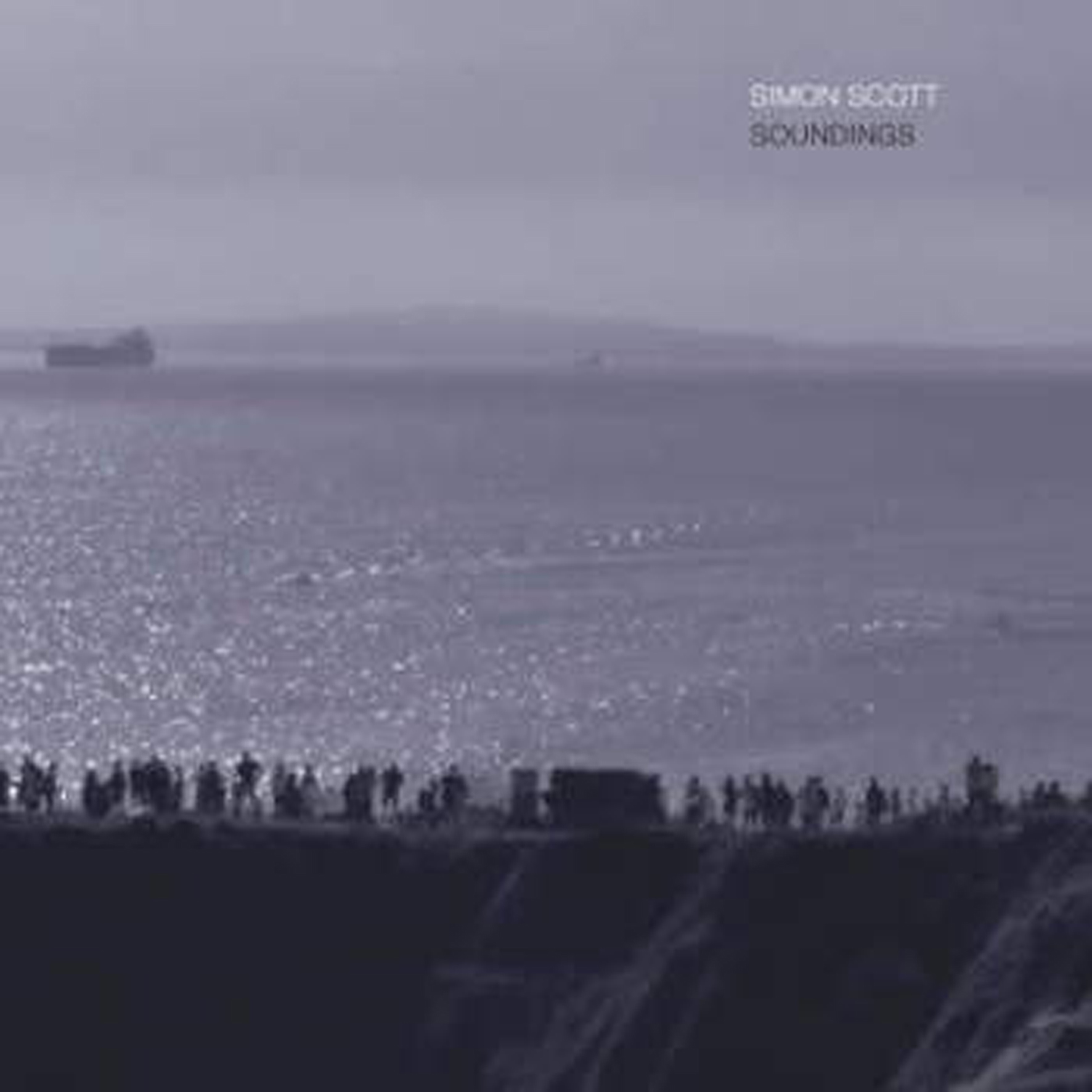Simon Scott, "Soundings"
 This is Simon Scott's formal debut for Touch and it is such a quintessential example of the label's aesthetic that it almost feels like a homecoming. It is similar to a homecoming in another way as well, as Scott composed these pieces from field recordings taken during Slowdive's extensive touring over the last few years, diligently editing and shaping them in hotel rooms during his idle hours. Upon returning, he teamed up with cellist Charlie Campagna and violinist Zachary Paul to transform his impressionistic audio diaries into a lushly beautiful and bittersweet ambient travelogue of sorts. In some ways, this side of Scott's work is less distinctive than his more dub-inflected albums, but he has a remarkably great ear for striking the perfect balance between vibrant textures and blurred, dreamlike elegance.
This is Simon Scott's formal debut for Touch and it is such a quintessential example of the label's aesthetic that it almost feels like a homecoming. It is similar to a homecoming in another way as well, as Scott composed these pieces from field recordings taken during Slowdive's extensive touring over the last few years, diligently editing and shaping them in hotel rooms during his idle hours. Upon returning, he teamed up with cellist Charlie Campagna and violinist Zachary Paul to transform his impressionistic audio diaries into a lushly beautiful and bittersweet ambient travelogue of sorts. In some ways, this side of Scott's work is less distinctive than his more dub-inflected albums, but he has a remarkably great ear for striking the perfect balance between vibrant textures and blurred, dreamlike elegance.
Slowdive's reunion touring led them to a lot of interesting and far-flung locales, but the most striking field recordings that made it onto this album originate from Brisbane, where Scott captured the sounds of a furious wind storm.Those crashing waves and fleeing birds appear prominently in the opening "Hodos," which is Soundings' most striking and evocative marriage of nature and artifice.That is not say that it is necessarily the album's strongest piece, but it is quite a beautiful one, as blossoming dark clouds of brooding strings slowly move across a battered shoreline.The way the spraying whitecaps and the languorously moaning strings interact feels quite organic, natural, and seamlessly intuitive, yet Scott's light touch works so beautifully because he was handed such a wonderful gift: the vibrant and visceral crash of the surf does a hell of a lot of the heavy lifting on its own.On the album's other pieces, the focus is necessarily more on Scott's own contributions (apocalyptic storms were apparently not a common occurrence on the tour).
Most of my favorite pieces fall near the end of the album, but not quite all of them, as the success of "Hodos" is followed by another gem in "Sakura."I am guessing that the gently babbling stream that surfaces in the piece was located somewhere in Japan, but Scott is quite sparing with the background details, largely limiting his contextual clues to the one-word song titles alone.There is a certain logic to that decision, as "Hodos" is the only piece on Soundings where nature has truly earned equal billing.With "Sakura," the beauty originates almost entirely from Scott himself, as the piece unfolds as a flickering and dreamlike reverie of processed guitar sheen. The album’s second (and more sustained) hot streak starts to cohere a few songs later with "Mae," a lazily churning and sizzling drone piece that gradually gives way to a quiet coda of happily chirping birds.Once that avian chorus takes their leave, the album blossoms into a thing of truly sublime beauty with the two pieces that follow: "Grace" and "Nigh."On "Grace," a warm and gently undulating haze of strings twists and drifts across a landscape of shivering and shuddering chord swells.It is an absolutely rapturous piece of music, but "Nigh" is even better still, cohering into a sun-dappled and lovely procession of chord swells mingled with swooning violin melodies and a dreamlike nimbus of subdued flutter and hiss.
For me, those two pieces are the true beating heart and emotional core of the album, but Scott saves a couple of other strong ideas for the album's final act.I am guessing that "Baaval" originated in either Moscow or the Arctic Circle, as both were among Scott's stated recording locations and it is initially a very dark and cold-sounding piece, evoking a windswept expanse of frozen wasteland.By the end, however, it warms into something approaching a sort of precarious radiance, like a faint sunrise chasing away some of the more menacing shadows.That piece gives way to the album’s slow-burning closing epic, the 15-minute "Apricity."For the most part, it marks a warm and lushly beautiful return the terrain of "Nigh," as rich, slow-moving chord swells surge beneath a lovely and lyrical violin melody.As a result, "Apricity" initially seems poised to be the album's crown jewel, but it takes a curious detour around the nine-minute mark and rides out its final third as kind of a locked-groove of gently pulsing, pastoral ambient music.
I am admittedly a bit perplexed as to why Scott chose to dilute one of his strongest pieces in that fashion, as well as end the album on such a comparatively forgettable note.Artists sure can be inscrutable sometimes.Still, it is not nearly enough of a wobble to derail an otherwise excellent album.Soundings is a curious sort of excellent album, however, wonderfully exceeding my expectations some moments and leaving me scratching my head during others.For example, the very restrained and subtle use of field recordings for much of the album feels like an exasperating missed opportunity to me, as Scott could probably have gotten all of the same recognizable sounds without ever leaving southern California.There is nothing among the bird and water recordings that distinctively call to mind Peru, Tokyo, or Moscow, even though Scott recorded in all those places.On another level, however, that decision is actually kind of cool, as Scott eschewed the easy and obvious path to make something considerably more elusive and abstract: a record of his own impressions during a sometimes beautiful, sometimes lonely, sometimes disorienting adventure through many of the great cities of the world.As such, Soundings is a dreamlike procession of elusive individual moments brought to vivid life.Granted, it is easy to imagine a more evocative, richly textured, and immersive album that might have resulted if Scott had taken a more straightforward path, but that album does not exist.This album, however, does exist and it is often an achingly lovely and poignant one.



